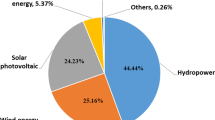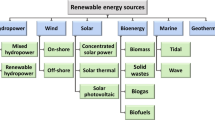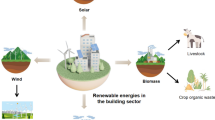Abstract
Rooftop solar (RTS) projects have the potential to contribute to climate change mitigation and sustainable development objectives. The Indian government has set an ambitious target of adding 100 GW of solar capacity by 2022, with 40 GW allocated for RTS segment. However, only 8.2 GW (< 25%) of this target has been achieved thus far. The low uptake of RTS is attributed to the complexity and inefficiency in the current implementation process, along with a lack of coordination among various implementing agencies. Leveraging information technology (IT) has emerged as a promising strategy to address these challenges and unleash the full potential of RTS systems. This approach seeks to consolidate key stakeholders onto a unified web platform, simplifying administrative tasks for agencies, reducing processing times, and fostering connections between consumers and legitimate vendors. By delineating roles and responsibilities within defined timeframes, the adoption of IT measures aims to support RTS implementation at both state and national levels. This study examines the potential of incorporating a web-based IT platform into the current RTS implementation process of the Odisha Renewable Energy Development Agency. A simplified approach was developed to expedite RTS projects in Odisha with reduced reliance on human intervention and resources. This methodology was effectively demonstrated with the State Nodal Agency (SNA), resulting in the execution of around 850 projects, totaling 33 MWp (with capacities ranging from 1–10 kW) of residential grid-connected RTS projects. As a result, other SNAs have embraced this model, fostering RTS advancement and consumer engagement through web-based IT platforms.
Graphical Abstract









Similar content being viewed by others
Data availability
Data supporting this study is included within the article and supporting materials.
Notes
"Panchayat" refers to a local self-government institution in rural areas of India, typically consisting of elected representatives who govern at the village or small-town level.
References
Adithya SN (2016) Large-scale implementation of grid-connected rooftop solar photovoltaic system in India - potential, challenges, outlook, and technical impact. 2016 International Symposium on Electrical Engineering (ISEE), Hong Kong. https://doi.org/10.1109/EENG.2016.7846353
Aggarwal AK, Syed AA, Garg S (2020) Diffusion of residential RT solar – is lack of funds the real issue? Int J Energy Sect Manag 14:316–334. https://doi.org/10.1108/IJESM-02-2019-0004
Anwar K, Deshmukh S (2018) Assessment and mapping of solar energy potential using artificial neural network and GIS technology in the southern part of India. Int J Renew Energy Res 8(2):974–985
ASPI (2022) Getting India to Net Zero: A report of the high-level policy commission on getting Asia to net zero. Asia Society Policy Institute (ASPI). https://asiasociety.org/sites/default/files/2022-09/ASPI_Getting%20India%20to%20Net%20Zero_Report.pdf. Accessed 23 Dec 2023
Bañales S (2020) The enabling impact of digital technologies on distributed energy resources integration. J Renew Sustain Energy (12):045301. https://www.researchgate.net/publication/343598607_The_enabling_impact_of_digital_technologies_on_distributed_energy_resources_integration. Accessed 23 Dec 2023
Beck F, Martinot E (2004) Renewable energy policies and barriers. Encycl Energy (5):365–383. https://biblioteca.cejamericas.org/bitstream/handle/2015/3308/Renewable_Energy_Policies_and_Barriers.pdf?sequence=1&isAllowed=y. Accessed 24 Dec 2023
BTI (2024) Indian Solar Compass. Bridge to India. https://bridgetoindia.com/report/india-solar-compass-q1-2024/. Accessed 29 Dec 2023
BTI (2016) Poor Implementation of Net-metering Policies Poses a Major Challenge for Rooftop Solar. Bridge to India (BTI), November 2016. http://www.bridgetoindia.com/poor-implementationnet-metering-policies-poses-major-challenge-rooftop-solar/. Accessed 28 Dec 2023
CEEW (2016) Filling the Skill Gap in India’s Clean Energy Market: Solar Energy Focus. Council on Energy, Environment and Water (CEEW) and the Natural Resources Défense Council (NRDC). https://www.ceew.in/publications/filling-skill-gap-india%E2%80%99s-clean-energy-market. Accessed 23 Dec 2023
Chandel R, Chandel SS, Malik P (2022) Perspective of new distributed grid-connected roof top solar photovoltaic power generation policy interventions in India. Energy Policy 168:113–122. https://doi.org/10.1016/j.enpol.2022.113122
Chateau J, Dang G, MacDonald M, Spray J, Thube S (2023) A Framework for Climate Change Mitigation in India. International Monetary Fund Working Paper WP/23/218. https://www.imf.org/en/Publications/WP/Issues/2023/10/20/A-Framework-for-Climate-Change-Mitigation-in-India-535854. Accessed 28 Apr 2024
Das A, Saini V, Parikh K, Parikh J, Ghosh P, Tot M (2023) Pathways to net zero emissions for the Indian power sector. Energ Strat Rev 45:101042. https://doi.org/10.1016/j.esr.2022.101042
Das B (2022) Rooftop solar: Why India is now considered to be a laggard globally. Down to Earth, Centre for Science and Environment, New Delhi
Deloitte (2019) Scaling up of rooftop solar in the SME sector in India. https://www2.deloitte.com/in/en/pages/about-deloitte/articles/solar-rooftop-PR.html. Accessed 23 Dec 2023
Dhankhar H, Anwer NA (2019) Critical analysis of present net metering regulatory framework and identification of potential barriers in the growth of rooftop market. Lecture Notes Electrical Eng 553:825–835. https://doi.org/10.1007/978-981-13-6772-4_71
Dhingra T, Sengar A, Sajith S (2023) Identifying, analysing, and prioritizing barriers in the Indian industrial and commercial rooftop solar sector. Sol Energy 254:15–26. https://doi.org/10.1016/j.solener.2023.02.056
Dondariya C, Porwal D, Awasthi A, Shukla AK, Sudhakar K (2018) Performance simulation of grid-connected rooftop solar PV system for small households: A case study of Ujjain, India. Energy Reports 4:546–553. https://doi.org/10.1016/j.egyr.2018.08.002
Dutt D (2020) Understanding the barriers to the diffusion of rooftop solar: A case study of Delhi (India). Energy Policy 144:111674. https://doi.org/10.1016/j.enpol.2020.111674
Dutta A, Das S (2020) Adoption of grid-connected solar rooftop systems in the state of Jammu and Kashmir: A stakeholder analysis. Energy Policy 140:111382. https://doi.org/10.1016/j.enpol.2020.111382
E&Y (2022) Accelerating India’s clean energy transition. Ernst & Young, India
Eco-Cities India Program (2015) Private sector solutions for sustainable urban development. https://www.ecocities.in
Garg V, Buckley T (2019) Vast Potential of Rooftop Solar in India: Setting the Pace for Rapidly Increasing Rooftop Solar Installations in India. Institute for Energy Economics and Financial Analysis (IEEFA), Ohio. https://ieefa.org/resources/vast-potential-rooftop-solar-india. Accessed 23 Dec 2023
Goel M (2016) Solar rooftop in India: Policies, challenges and outlook. Green Energy Environ 1(2):129–137. https://doi.org/10.1016/j.gee.2016.08.003
GoI (2024) 500 GW Non-fossil Fuel Target. Ministry of Power, government of India (GoI), New Delhi. https://powermin.gov.in/en/content/500gw-nonfossil-fuel-target. Accessed 23 Apr 2024
Gulia J, Thayillam A, Sharma P, Garg V (2022) Indian Residential Rooftops: A Vast Trove of Solar Energy Potential. Institute for Energy Economics and Financial Analysis (IEEFA), Ohio. https://ieefa.org/resources/indian-residential-rooftops-vast-trove-solar-energy-potential. Accessed 23 Dec 2023
Gupta SK, Purohit P (2013) Renewable energy certificate mechanism in India: A preliminary assessment. Renew Sustain Energy Rev 22:380–392. https://doi.org/10.1016/j.rser.2013.01.044
IEA (2021) Unlocking the Economic Potential of Rooftop Solar PV in India. International Energy Agency (IEA), Paris. https://www.iea.org/reports/unlocking-the-economic-potential-of-rooftop-solar-pv-in-india. Accessed 24 Dec 2023
IEA (2022) World Energy Outlook. International Energy Agency. https://www.iea.org/reports/world-energy-outlook-2022. Accessed 24 Dec 2023
IGEP (2022) IGEN-GEC-Rooftop Solar PV component. https://www.giz.de/en/worldwide/70459.html. Accessed 23 Dec 2023
IRENA (2019a) Climate Change and Renewable Energy: National policies and the role of communities, cities and regions. Report to the G20 Climate Sustainability Working Group (CSWG), International Renewable Energy Agency (IRENA), Abu Dhabi, June 2019. https://www.irena.org/-/media/Files/IRENA/Agency/Publication/2019/Jun/IRENA_G20_climate_sustainability_2019.pdf. Accessed 25 Dec 2023
IRENA (2019b) Future of Solar Photovoltaic: Deployment, investment, technology, grid integration and socio-economic aspects. International Renewable Energy Agency (IRENA), Abu Dhabi, November 2019. https://www.irena.org/-/media/Files/IRENA/Agency/Publication/2019/Nov/IRENA_Future_of_Solar_PV_2019.pdf. Accessed 27 Dec 2023
Jain S, Garg T, Jain R, Kuldeep N (2019) Demystifying India’s rooftop solar policies: A state-level analysis. Council on Energy, Environment and Water (CEEW), New Delhi. https://www.ceew.in/sites/default/files/demystifying-india-rooftop-solar-policies.pdf. Accessed 22 Dec 2023
Joshi S, Mittal S, Holloway P, Shukla PR, Gallachóir BO, Glynn J (2021) High-resolution global spatiotemporal assessment of rooftop solar photovoltaics potential for renewable electricity generation. Nat Commun 12:5738. https://doi.org/10.1038/s41467-021-25720-2
Joshi A (2022) Phase-II of Grid-connected Rooftop Solar Program extended until March 31, 2026. https://www.mercomindia.com/phase-ii-of-residential-rooftop-solar-program-extended-until-march-2026. Accessed 23 Dec 2023
Kappagantu R, Daniel SA, Venkatesh M (2015) Analysis of rooftop solar pv system implementation barrier in puducherry smart grid pilot project. Proc Technol 21:490–497. https://doi.org/10.1016/j.protcy.2015.10.033
Khandekar N (2021) How rooftop solar struggles even in India’s most sunny cities, https://www.indiaspend.com/development/rooftop-solar-energy-inconsistent-regulatory-policies-high-costs-patchy-implementation-subsidy-scheme-763796. Accessed 13 Dec 2023
Kumar AG, Sindhu MR, Mohan V, Viswanathan R, Sudhakaran AV (2023) An adaptive staggered investment strategy for promotion of residential rooftop solar PV installations in India. Int J Sustain Energy Plan (37):75–94. https://researchrepository.rmit.edu.au/esploro/outputs/journalArticle/An-adaptive-staggered-investment-strategy-for/9922256412701341. Accessed 17 Dec 2023
Luthra S, Kumar V, Kumar S, Haleem A (2011) Barriers to implement green supply chain management in automobile industry using interpretive structural modelling technique – an Indian perspective. J Ind Eng Manag (4):231–257. https://www.jiem.org/index.php/jiem/article/view/244. Accessed 23 Dec 2023
Mahadevan M, Meeks R, Yamano T (2023) Reducing information barriers to solar adoption: Experimental evidence from India. Energy Econ 120:106600. https://doi.org/10.1016/j.eneco.2023.106600
MERCOM (2014) Survey of India Consumer Perceptions on Renewable Energy. https://mercomindia.com/wp-content/uploads/2018/01/Survey_MercomIndiaSurveyRenewables.pdf. Accessed 19 Aug 2023
Mishra T, Rabha A, Kumar U, Arunachalam K, Sridhar V (2020) Assessment of solar power potential in a hill state of India using remote sensing and geographic information system. Remote Sens Appl: Soc Environ 9:100370. https://doi.org/10.1016/j.rsase.2020.100370
MNRE (2019) Operational guidelines for implementation of Phase-II of grid-connected Rooftop Solar Programme for achieving a cumulative capacity of 40,000 MW from Rooftop Solar (RTS) Projects by the year 2022. Ministry of New and Renewable Energy (MNRE), Government of India, New Delhi. https://www.itsmysun.com/solar-state-wise-polic/. Accessed 24 May 2023
MNRE (2010) Jawaharlal Nehru National Solar Mission. Ministry of New and Renewable Energy (MNRE), Government of India. https://www.india.gov.in/jawaharlal-nehru-national-solar-mission-scheme. Accessed 20 Mar 2023
MNRE (2011) Solar/Green Cities. Ministry of New and Renewable Energy (MNRE). New Delhi. Available Online: http://164.100.94.214/solar-cities. Accessed 22 March 2023
MNRE (2015a) Scaling up of Grid Connected Solar Power Projects from 20,000 MW by the year 2021–22 to 1,00,000 MW by the year 2021–22 under the National Solar Mission. Ministry of New and Renewable Energy (MNRE), Government of India, New Delhi
MNRE (2015b) State-wise Estimated Solar Power Potential in the Country. Ministry of New and Renewable Energy (MNRE, Government of India, New Delhi
MNRE (2016) Solar Resources. Solar Energy Centre, Ministry of New and Renewable Energy (MNRE, Government of India, New Delhi
MNRE (2017) National Solar Mission - Grid connected solar rooftop programme in India. EU – India Technical Cooperation Project: Energy, https://solarrooftop.gov.in/notification/Notification-24012017.pdf. Accessed 24 Apr 2023
MNRE (2018) National Portal of Rooftop Solar. Ministry of New and Renewable Energy (MNRE), Government of India, New Delhi, https://solarrooftop.gov.in/. Accessed 27 Dec 2023
MNRE, (2022a) Solar RPO for States in India. Ministry of New and Renewable Energy (MNRE), Government of India, New Delhi. https://mnre.gov.in/solar/rpo/
MNRE (2022b) Solar Policies and Guidelines. Ministry of New and Renewable Energy (MNRE), Government of India, New Delhi. https://mnre.gov.in/Solar/policy-and-guidelines
MNRE (2024) Roof Top Solar Capacity installations growing at Compound annual growth rate of around 46%: Union Power and New & Renewable Energy Minister, Ministry of New and Renewable Energy (MNRE), Government of India, New Delhi, https://pib.gov.in/PressReleasePage.aspx?PRID=1989806. Accessed 19 Mar 2024
Mokhtara C, Negrou B, Settou N, Bouferrouk A, Yao T (2021) Optimal design of grid-connected rooftop PV systems: An overview and a new approach with application to educational buildings in arid climates. Sustain Energy Technol Assess 47:101468. https://doi.org/10.1016/j.seta.2021.101468
Omer AM (2008) Focus on low carbon technologies: The positive solution. Renew Sustain Energy Rev 12:2331–2357. https://doi.org/10.1016/j.rser.2007.04.015
OREDA (2019) Solar Rooftop PV Cell. Odisha Renewable Energy Development Agency (OREDA), Bhubaneswar. http://rts.odisha.gov.in/
Painuly JP (2001) Barriers to renewable energy penetration; a framework for analysis. Renew Energy 24:73–89. https://doi.org/10.1016/S0960-1481(00)00186-5
Pandey P, Sharma A (2021) Knowledge politics, vulnerability and recognition-based justice: public participation in renewable energy transitions in India. Energy Res Social Sci 71:101824. https://doi.org/10.1016/j.erss.2020.101824
Pandey AK, Tyagi VV, Selvaraj J, Rahim NA, Tyagi SK (2016) Recent advances in solar photovoltaic systems for emerging trends and advanced applications. Renew Sustain Energy Rev 53:859–884. https://doi.org/10.1016/j.rser.2015.09.043
Purohit P, Kandpal TC (2005) Solar photovoltaic water pumping in India: a financial evaluation. Int J Ambient Energy 26(3):135–146. https://doi.org/10.1080/01430750.2005.9674983
Purohit I, Purohit P (2017) Technical and economic potential of concentrating solar thermal power generation in India. Renew Sustain Energy Rev 78:648–667. https://doi.org/10.1016/j.rser.2017.04.059
Purohit I, Purohit P (2018) Performance assessment of grid-interactive solar photovoltaic projects under India’s national solar mission. Appl Energy 222:25–41. https://doi.org/10.1016/j.apenergy.2018.03.135
PwC (2018) Rooftop Solar in India: Looking back, Looking ahead. PricewaterhouseCoopers (PwC) Pvt Ltd, India and Climate Investment Funds. https://www.scribd.com/document/439810088/rooftop-solar-pv-in-india-ctf-pwc-v8pdf-0. Accessed 21 Mar 2024
Rathore PKS, Rathore S, Singh RP, Agnihotri S (2018) Solar power utility sector in India: challenges and opportunities. Renew Sustain Energy Rev 81:2703–2713. https://doi.org/10.1016/j.rser.2017.06.077
Rathore PKS, Chauhan DS, Singh R (2019) Decentralized solar rooftop photovoltaic in India: On the path of sustainable energy security. Renew Energy 131:297–307. https://doi.org/10.1016/j.renene.2018.07.049
Sarangi GK, Taghizadeh HF (2021) Rooftop solar development in India: Measuring policies and mapping business models. ADBI Working Paper Series, No. 1256, Asian Development Bank Institute (ADBI), Tokyo. https://www.adb.org/publications/rooftop-solar-development-india-policies-mapping-business-models. Accessed 20 Mar 2024
Shah S (2018) All You Wanted To Know About The SUPRABHA Solar Scheme. https://www.greenworldinvestor.com/2018/11/15/all-you-wanted-to-know-about-the-suprabha-solar-scheme/. Accessed 23 Jan 2023
Sharma N (2024) Revised Solar Subsidy and Policies for Rooftop Solar Installations in India. ORNATE Solar, https://ornatesolar.com/blog/revised-solar-subsidy-and-policies-for-rooftop-solar-installations-in-india. Accessed 27 Mar 2024
Sharma NK, Tiwari PK, Sood YR (2012) Solar energy in India: strategies, policies, perspectives and future potential. Renew Sustain Energy Rev 16:933–941. https://doi.org/10.1016/j.rser.2011.09.014
Sharma S, Jain G, Mishra S, Bhattacharya B (2017a) Assessment of roof-top solar energy potential in proposed smart cities of India. Space Applications Centre (SAC), Ahmedabad, India
Sharma C, Sharma AK, Mullick SC, Kandpal TC (2017b) Solar thermal power generation in India: effect of potential incentives on unit cost of electricity. Int J Sustain Energy 36:722–737. https://doi.org/10.1080/14786451.2015.1088016
Shukla AK, Sudhakar K, Baredar P, Mamat R (2018) Solar PV and BIPV system: Barrier, challenges and policy recommendation in India. Renew Sustain Energy Rev 82(3):3314–3322. https://doi.org/10.1016/j.rser.2017.10.013
Singh R (2020) Approximate rooftop solar PV potential of Indian cities for high-level renewable power scenario planning. Sustain Energy Technol Assess 42:100850. https://doi.org/10.1016/j.seta.2020.100850
Singh R, Banerjee R (2015) Estimation of rooftop solar photovoltaic potential of a city. Sol Energy 115:589–602. https://doi.org/10.1016/j.solener.2015.03.016
Sudhakar S, Lovedeep M, Bhattacharjee U, Graud S, Tripathi AK (2014) Reaching the Sun with Rooftop Solar. The Energy and Resource Institute (TERI), New Delhi
SUPRABHA (2022) The Sustainable Partnership for Rooftop Solar Acceleration in Bharat (SUPRABHA) Programme. http://www.nbirt.org.in/suprabha-programme. Accessed 29 Dec 2022
Tarai RK, Kale P (2018) Solar PV policy framework of Indian States: Overview, pitfalls, challenges, and improvements. Renewable Energy Focus 26:46–57. https://doi.org/10.1016/j.ref.2018.07.001
Thakur J, Chakraborty B (2019) Impact of compensation mechanisms for PV generation on residential consumers and shared net metering model for developing nations: A case study of India. J Clean Prod 218:696–707. https://doi.org/10.1016/j.jclepro.2019.01.286
The Electricity Act, (2003) No. 36 Ministry of Law and Justice (MoLJ), Government of India, New Delhi. https://cercind.gov.in/Act-with-amendment.pdf. Accessed 27 Dec 2022
Timilsina GR, Kurdgelashvili L, Narbel PA (2012) Solar energy: markets, economics and policies. Renew Sustain Energy Rev 16:449–465. https://doi.org/10.1016/j.rser.2011.08.009
Trivedi S, Ray I, Vulturius G (2018) Scaling up Rooftop Solar Power in India: The Potential of Solar Municipal Bonds. Climate Policy Initiatives (CPI), New Delhi
UNFCCC (2015) India’s Intended Nationally Determined Contribution: Working Towards Climate Justice. United Nations Framework Convention on Climate Change (UNFCCC), Bonn
UNFCCC (2022) India’s updated first Nationally Determined Contribution under Paris Agreement (2021–2030). United Nations Framework Convention on Climate Change (UNFCCC), Bonn
Him Urja (2023) Approved Rates of Grid Connected Roof Top Solar Plants. Government of Himachal Pradesh, Shimla, India. https://himurja.hp.gov.in/wp-content/uploads/2022/03/finsummary.pdf. Accessed 19 Mar 2024
Vallecha H, Bhattacharjee D, Osiri JK, Bhola P (2021) Evaluation of barriers and enablers through integrative multicriteria decision mapping: Developing sustainable community energy in Indian context. Renew Sustain Energy Rev 138:110565. https://doi.org/10.1016/j.rser.2020.110565
van Soest HL, den Elzen MGJ, van Vuuren DP (2021) Net-zero emission targets for major emitting countries consistent with the Paris Agreement. Nat Commun 12:2140. https://doi.org/10.1038/s41467-021-22294-x
World Bank (2020) World Bank Approves $625 Million to Support Grid Connected Rooftop Solar Program in India. https://www.worldbank.org/en/news/press-release/2016/05/13/world-bank-approves-625-million-to-support-grid-connected-rooftop-solar-program-in-india. Accessed 19 Jan 2023
Yaqoot M, Diwan P, Kandpal TC (2016) Review of barriers to the dissemination of decentralized renewable energy systems. Renew Sustain Energy Rev 58:477–490. https://doi.org/10.1016/j.rser.2015.12.224
Acknowledgements
The first two contributors, I.P. and A.K.S., extend their gratitude to the International Finance Corporation (IFC), the European Union, and the Odisha Renewable Energy Development Agency (OREDA) for their support in the successful execution of the work under Eco-Cities program.
Author information
Authors and Affiliations
Corresponding author
Ethics declarations
Conflict of interest
The authors declare no competing interests.
Additional information
Publisher's Note
Springer Nature remains neutral with regard to jurisdictional claims in published maps and institutional affiliations.
Supplementary Information
Below is the link to the electronic supplementary material.
Rights and permissions
Springer Nature or its licensor (e.g. a society or other partner) holds exclusive rights to this article under a publishing agreement with the author(s) or other rightsholder(s); author self-archiving of the accepted manuscript version of this article is solely governed by the terms of such publishing agreement and applicable law.
About this article
Cite this article
Purohit, I., Sharma, A.K. & Purohit, P. Leveraging information technology for accelerating residential rooftop solar: A case study from Odisha, India. Mitig Adapt Strateg Glob Change 29, 47 (2024). https://doi.org/10.1007/s11027-024-10141-5
Received:
Accepted:
Published:
DOI: https://doi.org/10.1007/s11027-024-10141-5




